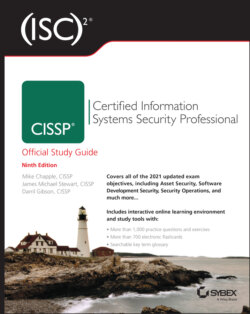Читать книгу (ISC)2 CISSP Certified Information Systems Security Professional Official Study Guide - Mike Chapple - Страница 82
Compliance Policy Requirements
ОглавлениеCompliance is the act of conforming to or adhering to rules, policies, regulations, standards, or requirements. Compliance is an important concern of security governance. On a personnel level, compliance is related to whether individual employees follow company policy and perform their job tasks in accordance with defined procedures. Many organizations rely on employee compliance in order to maintain high levels of quality, consistency, efficiency, and cost savings. If employees do not maintain compliance, it could cost the organization in terms of profit, market share, recognition, and reputation. Employees need to be trained in regard to what they need to do (i.e., stay in line with company standards as defined in the security policy and remain in compliance with any contractual obligations such as Payment Card Industry Data Security Standard [PCI DSS] to maintain the ability to perform credit card processing); only then can they be held accountable for violations or lacking compliance. Compliance is a form of administrative or managerial security control because it focuses on policies and people abiding by those policies (as well as whether the IT and physical elements of the organization comply with policies).
Compliance enforcement is the application of sanctions or consequences for failing to follow policy, training, best practices, and/or regulations. Such enforcement efforts could be performed by the chief information security officer (CISO) or chief security officer (CSO), worker managers and supervisors, auditors, and third-party regulators.
Compliance is also a regulation concern. That topic is covered in Chapter 4.
